interview by Michael McCarthy
These days, you could probably name a dozen acts that consist simply of two members, many simply featuring one member who plays bass and one member who plays drums. Royal Blood is an exceptional one that immediately comes to mind. In the case of Death From Above, formerly known as Death From Above 1979, the duo consists of vocalist and drummer Sebastien Grainger and bassist and keyboardist Jesse F. Keeler. Their sound could be described as post-hard rock, post-metal or post-punk. Whatever you call it, it’s post because it’s what comes after what came before, a newly developed sound that culls a little bit of this and a little bit of that from all of those genres and twists them into something wholly modern. (In fact, you could say that they’re the future, being that they were doing the drum and bass duo thing way back in 2004, a decade before it had become a thing.) Look at it this way: classic metal is like the original iPhone. Death From Above has taken that technology – so to speak – and turned it into the iPhone 9; they’re already doing things the new model can’t do yet. When they put out their next album, they’ll most likely be the iPhone 10 because they’re constantly reinventing themselves, becoming more and more advanced each time they put out an album and expand their sound. On their new record, OUTRAGE! Is Now, the guys truly broke the mold when they decided to stop looking at the band like this sacred object that they had to live up to. In their case, people liked the sound of their first album so much that they felt like they had to stay within its mold when they made their last album, The Physical World, less they disappoint people. As you can imagine, trying to live up to that was rather frustrating. So, while making OUTRAGE!, they decided to forget about that and just wrote whatever struck their fancy. After all, no matter what they sound like exactly, they’re always going to sound like Death From Above because, well, they are Death From Above. This outlook has paid off already with OUTRAGE! Is Now being heralded as one of the year’s very best albums. If you haven’t checked it out yet and you like aggressive music, or rock that you can simultaneously bang your head and dance to, then you owe it to yourself to check it out now. You will not be disappointed. In the following interview, I chat with Sebastian about dropping the 1979 from their name, how they approach songwriting, their forthcoming tour and his side-project band, American Lips.
MM: I know you started off by leaving the 1979 off of some fliers and that lead to your leaving it off the new album cover. What’s the current status on that? Is James Murphy of Death From Above Records leaving you alone? Has he given you his blessing?
SG: When it first came out he was asked by a couple of different media outlets for a statement and he started writing out his official statement and then halfway through just decided, you know what, I don’t need to do this publicly. He just texted Jesse and told him that it was cool, that he was happy that we were [dropping the 1979]. He basically just asserted that it was our name anyway. He’s like, that’s what your band is called.
MM: Do you feel like a huge weight has been lifted from your chest now that you no longer have to use the 1979?
SG: It’s not that big of a deal. We had a moment where we realized that it wasn’t our name, you know? And the reasons why it wasn’t our name were kind of boring and un-rock ‘n’ roll. And so it would’ve been fine either way. It was kind of a cheeky move to just stop using it, you know? We just wanted to see what would happen. You know what? Nothing happened.
MM: I know you guys didn’t write much of the new record in the same room this time. What was the reasoning behind that? And how did things come together this time?
SG: It was our attempt to get something different out of the band. It was that and just logistics. I mean, we don’t live in the same city, so we did a certain amount of writing together up at Jesse’s farm and I found that we were going down pretty well trotted paths doing it that way. And as a songwriter and drummer, I find that those two tasks need to be fairly well delineated. I don’t know if it’s always been this way, but I find it difficult to be creative in a songwriter way when I’m behind the kit. So, those two jobs have become very separate in my mind and they only come together after the song is written.
MM: How do you approach the songwriting then? Do you sing ideas into a tape recorder or start by programming electronic beats or how does the magic happen?
SG: Yeah, it’s kind of different for every song. I mean, we don’t really discriminate about who comes up with the nucleus of an idea. If I’m sitting around playing bass, and I stumble upon a cool riff and I hum a cool melody on top of it, that’ll be the start of the song. I’ll take that to Jesse and see what he comes up with next. And he’ll do the same. We both have different tastes in music and different approaches to writing, so sometimes he’ll write a riff and I’ll be like, I have no idea what to do with that drum-wise. So, he’ll demo the drums as well. So, there’s a give and take, you know? I’ll give him riffs. He’ll give me bass ideas. Or drum ideas. And we kind of go back and forth that way. But, yeah, it usually starts with some kind of riff and melodic idea and then once the song is more fleshed out I’ll [write lyrics]. I find the lyric writing to be something I increasingly take more care with and I don’t take that task lightly. So, I usually wait until the bulk of the music is written and I know that it’s gonna be like a cool song before I’ll even dedicate a lot of time to the lyric writing because it’s the thing that, for me, takes the most time and attention. I don’t like to go all the way down a path with a song and then find out we’re not gonna use it.

MM: I had a couple questions pertaining to the lyrics. On the title track, you sing, “Suddenly, I don’t belong to anyone or anything.” What did you mean by that?
SG: I think, as I get older, I find it more difficult to relate to people in general. I think that’s natural. I think that the sort of social dynamic of the human animal starts off with this it takes a village situation where you’re a kid and you’re surrounded by the kids then you grow up and you have your crew and your gang and then when you get older [it’s like] I like my wife, I’m into my bandmates – I like people, but the way I relate to people is not as simple as it was before. I think also, as an artist and a writer, you have to sit a little outside of society in a way. Come sit on the fence and see what’s going on. That’s kind of what it’s referring to. That it’s increasingly difficult to relate to the status quo, you know?
MM: Sure. What generation are you a part of?
SG: I guess I’m part of X.
MM: I think that’s what I am, too. I’m 44, so I guess that would be about right for that.
SG: Yeah.
MM: On “Nomad” there’s a lyric I really love. You sing, “Dreams are like water to the fires of nightmare lives.” Where did that come from?
SG: [Laughs] I think I was praying to the spirit of heavy metal when that lyric came out. The song, musically, always struck me as a metal anthem and I was writing the set of lyrics that, to me, is about something very specific. As I was writing it I realized that it was – like most of the lyrics on the record – I reduce them down to words that I find highly interpretable, you know? So, that someone can read the lyrics and impart their own experience with it. That line, I was thinking about something. I was thinking about someone who had a tough life and how the only thing that carried them through the harder times was a vision for the future. I find that in my life that’s what helps.
MM: Generally speaking, are you finding that you’re enjoying this run of DFA tours and albums more than before you took five years off?
SG: Yeah. I mean, it’s kind of difficult to relate to that time and that person because it was so long ago. It’s strange to talk about, but at that time I was kind of going through an identity crisis. What it meant to be a musician. What it meant to be a man. What it meant to be all these different things. And that contending with being this like character in a band that was so inextricably associated with another person. As a duo, you get kind of stitched together. And when you’re in your twenties, and you’re having this identity moment, that was difficult for me. Whereas now, it’s not really an issue. We’re like brothers. And the band is our band. Even when we started playing together again, I was reluctant to take any control over it. I was reluctant to sort of lead in a way. And now I just look at it as this is my band. It’s my band. It’s Jesse’s band. And both of us can do with it whatever we want. As it happens, those goals align for us and we’ve gotten a lot better at just being in the band.
MM: You just played Riot Fest. How did that go?
SG: It was all right. It was pretty good. It’s a good festival. Cool line-up. I find the one-off festival gigs on one hand very rewarding because you’re playing in front of these big audiences and they’re exciting. But when you’re not in the midst of a larger tour and you do a one-off show I find it a little bit harder to turn it on. I really revel in the rhythm of tour life. I like the idea of redemption. If you fuck something up one night, usually it’s not to the detriment of the show. I feel bad about it, but then you get to do it again the next night. And kind of improve on the entirety of the thing. So, that’s what I like. I like that rhythm and going into beast mode where I just become the extension of the show and the song. My only priority on the tour is to do a good show and everything else fades away. Whereas with festival life, there’s a lot of other things going on.
MM: I know you have a U.S. tour coming up – or has it started already?
SG: I think it starts around the 18th, 19th and 20th of October. It starts in Canada and then comes down through the states.
MM: Do you have any plans to tour overseas? Like Europe or anything?
SG: Yeah, in February we’re touring with At The Drive In through Europe. We’re just gonna be bouncing back and forth for the rest of the year for sure.
MM: For the U.S. dates, are you taking an opening act out on the road with you?
SG: Yeah, we’re bringing a band from Toronto called The Beaches. They’re just like a very young girl band. They’re from the neighborhood that Jesse and I started our band in.
MM: Cool.
SG: Yeah, it’s gonna be great.
MM: What are your thoughts on the vinyl comeback? I was just thinking I need to order your American Lips [side-project] album on vinyl. Are you a big vinyl fan?
SG: Yeah. Vinyl never went away for me. When it was kind of in a decline it was great because I remember one day, just going to this thrift shop in Toronto, and going through the ten cent bin and finding all these great records and then this dude came up and he goes, you like records? Come with me. We went to this backroom and there were these giant blue recycling bins four or five feet tall and they were just full of vinyl. At that point I kind of loaded up and started this big collection that kind of ebs and flows, has ebbed and flowed throughout my life. It was a good, cheap way to get music, you know?
MM: I was listening to American Lips on Spotify a little while ago and I really like it, but what is your hope for it? Is there any fear that if it catches on then it would interfere with DFA at all?
SG: [Laughs] I don’t think so. I mean, it’s kind of a bit of a passion project in a way. I’m not the primary songwriter. I just facilitate the whole thing and drum on it and mix the record and operate the label with the guitar player and singer and songwriter in that band. So, that band is more of a pet project in a sense. The other two members are a couple with two kids, so anytime we play a show it’s a pretty big deal. So, I don’t imagine that it would become this overwhelming endeavor.
Connect with Death From Above:

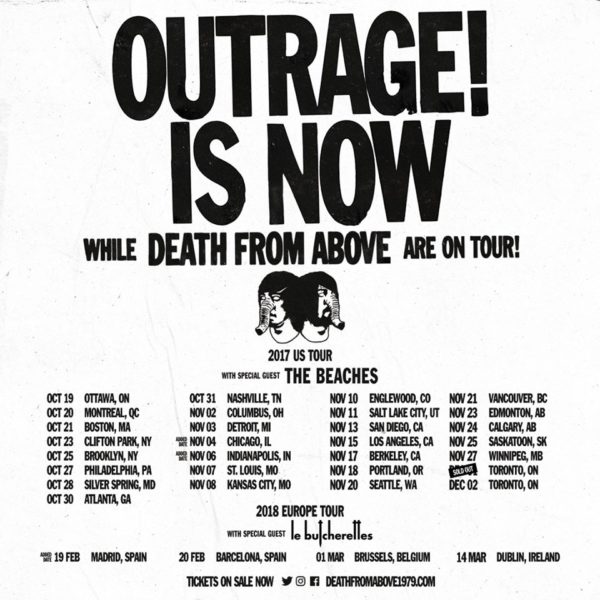
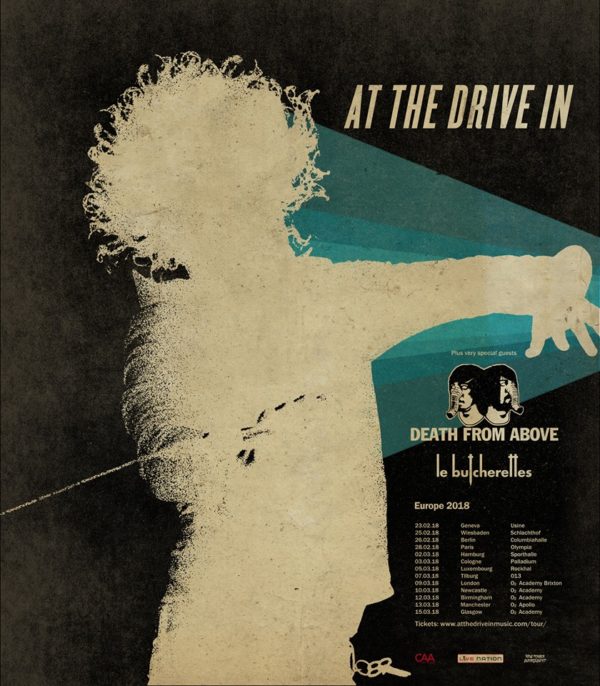
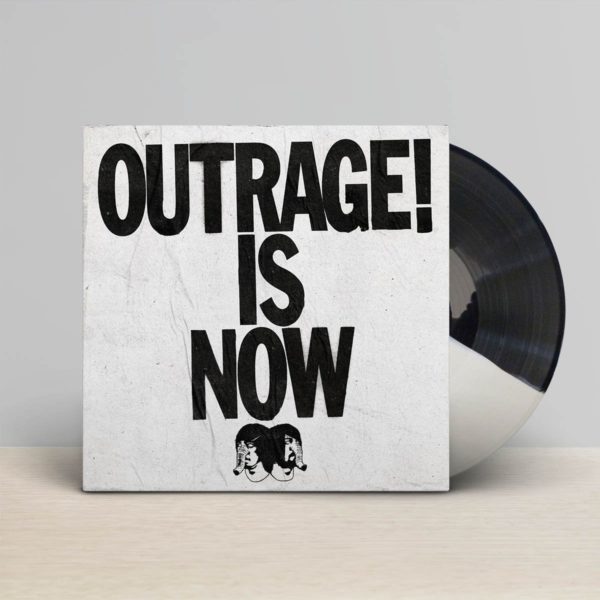
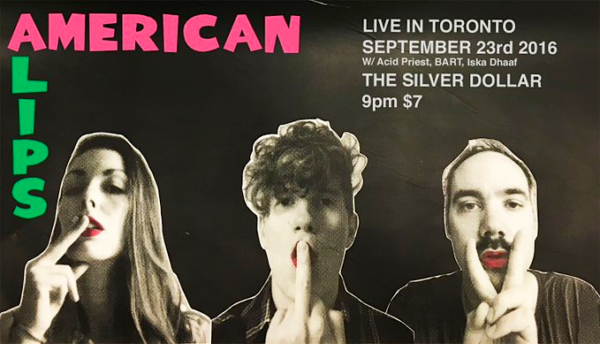
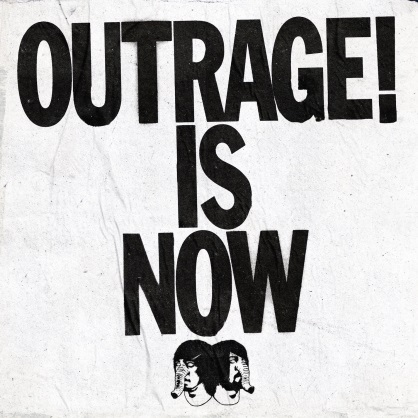
Leave a Reply